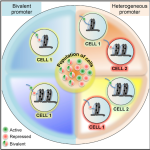Position/Role: Post-doc (M&I PhD)
Contact: alorzadeh[at]bcgsc.ca
Research Interests: Molecular Epigenomics, Chromatin Biology, Hematopoiesis, Bioinformatics, chIP-seq, Leukemia
Epigenetic mechanism of lineage commitment in hematopoiesis:
Hematopoiesis describes the process of formation and development of blood cells. During hematopoiesis, self-renewing hematopoietic stem cells (HSCs) are capable of differentiating into multi- lineage progenitors with reduced differentiation capacity and no self-renewing capability. Classical model of hematopoiesis describes dichotomous differentiation of HSC into multi-lineage progenitors committed to either the lymphoid or the myeloid lineage. Alternative proposal is “myeloid based” model where both lymphoid and myeloid outcomes remain coupled. Mammalian genomes carry non-uniform chemical marks covalently attached to DNA bases or to the chromatin proteins that regulate local activity states, supporting gene activation or silencing. These modifications undergo drastic changes through development and differentiation of cells. Cells at different stages of hematopoiesis hold the same genome, but they express different set of genes from one another. My interest is to investigate epigenetic modifications involved in governing lineage commitment and stem like properties of hematopoietic cells.
Publications:
Giambra V, Gusscott S, Gracias D, Song R, Lam SH, Panelli P, Tyshchenko K, Jenkins CE, Hoofd C, Lorzadeh A, Carles A, Hirst M, Eaves CJ, Weng AP. Epigenetic Restoration of Fetal-like IGF1 Signaling Inhibits Leukemia Stem Cell Activity. Cell Stem Cell. 2018 Sep 19. pii: S1934-5909(18)30436-3. doi: 10.1016/j.stem.2018.08.018.PMID: 30269902
Laporte AN, Poulin NM, Barrott JJ, Wang XQ, Lorzadeh A, Vander Werff R, Jones KB, Underhill TM, Nielsen TO. Death by HDAC Inhibition in Synovial Sarcoma Cells. Mol Cancer Ther. 2017 Dec;16(12):2656-2667.

Alireza Lorzadeh et al. provide a robust approach for combining genome-wide methylation profiles of histones with MNase accessibility. Application of this technology to primitive human cord blood and embryonic stem cells indicates differences in histone modifications and their relationship to transcription between these two cell types (Nucleosome Density ChIP-Seq Identifies Distinct Chromatin Modification Signatures Associated with MNase Accessibility. Cell reports 17, 2112–2124 – November 15, 2016)
Li L., Lorzadeh A., Hirst M. Regulatory variation: an emerging vantage point for cancer biology. WIREs Syst Biol Med 2014, 6:37–59.
